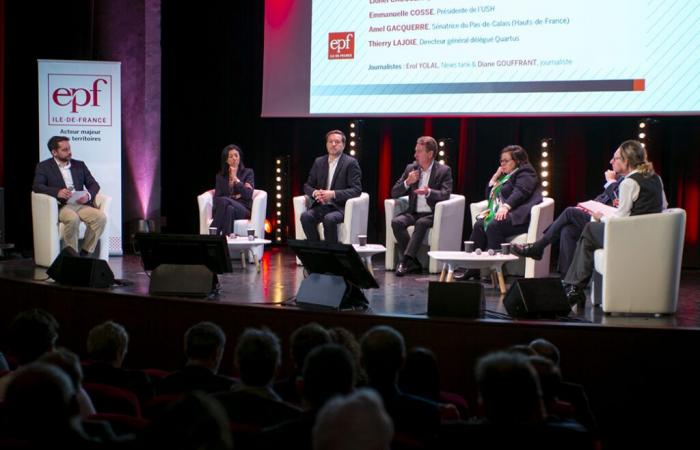If there was only one problem and one solution to the crisis that the housing sector has been going through for many months now, it would be happy. For the actors gathered this Wednesday, December 4 by the public land establishment ofÎle-de-France (Epfif), the recovery will be multifactorial and will therefore be accompanied by a diversity of initiatives and tools. Among them, the Energy renovation bankon which Amel Gacquerre, senator from Pas-de-Calais, is on board. “During a commission of inquiry that I chaired last semester for the Senate, we pinpointed the difficulty co-owners have in maintaining their housing and their building. Few banking and financial players support the fragile condominiums. We therefore launched the idea of creating a renovation bank with a view to responding to the challenge of energy renovation.” (see our article of July 24) A project which, according to the senator, must be found at the heart of the virtuous recovery of the housing sector because of its contribution to the purchasing power of residents and to the objectives of decarbonization “Fragile co-ownerships often become the nest of slumlords or unscrupulous actors”, a-. she underlines.
Lionel Causse, deputy for Landes and former president of the national housing council (CNH), for his part focused on the mobilization of vacant housingestimated at 3 million in France. “We must find a model to recover them. Today, every home is important!” In times of shortage, we pull out all the stops. “We are working with other deputies, associations and soon, we hope, with our fellow senators on this issue,” said Lionel Causse.
Regulate land prices and support projects of general interest
As municipal elections loom, regulations pile up and the political context deteriorates once again, Emmanuelle Cosse insisted on the need for regulation of land prices in the long term. “The debate on the reduction of public land must be put back on the table,” she said, after pointing out the joint responsibility of public and private owners.
But to move forward on these questions, which are as technical as they are divisive, and to call into question the taxation of the entire chain, “we still need a parliamentary majority”, whispered the president of the Social Union for Housing, who also underlined the work carried out with Valérie Létard (on the intervention of the minister, see our article today). Another element: state support for operations of general interest. “The production of social housing, the absorption of unsanitary housing… These missions should benefit from an ad hoc regime.”
A positive point nevertheless with the I will or the program Small towns of tomorrow which made it possible to develop a plethora of projects on hollow teeth or structures already built to be heavily restructured. Interesting interventions, while land is becoming harder and harder to acquire, and it is a question of massive trees.
In the opinion of Thierry Lajoie, Deputy Managing Director of Quartus, relevant mechanisms “anti-speculativeanti-bidding, and land management must be put in place, as well as systems benefiting communities. Today, it is so difficult for them to make the decision to build that it is unbelievable! They lack the means!” Thierry Lajoie said he was in favor of a “re-correlation” between the populations and the tax revenues of the municipalities (an undisguised criticism of the abolition of the housing tax), as well as the strengthening of right of pre-emption “which must be a public regulatory tool, particularly in tense areas”.






